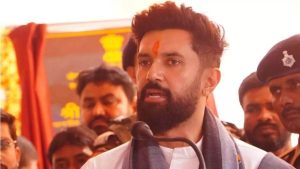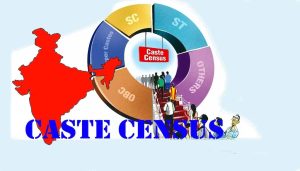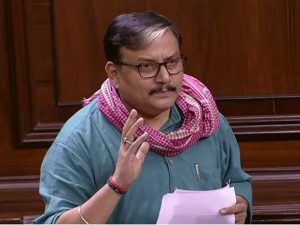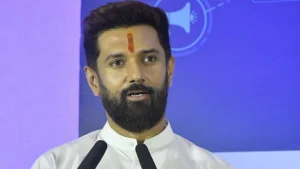Bihar – Union Food Processing Industries Minister and Lok Janshakti Party (Ram Vilas) chief Chirag Paswan on Thursday emphatically praised the NDA government’s decision to conduct a caste census alongside the general Census, describing it as a “historic” move. During a press conference in New Delhi, Paswan emphasized that the caste census would establish a robust foundation for India’s journey toward becoming a developed nation by 2047 while simultaneously strengthening social justice frameworks across the country.
“The decision to implement a caste census represents a watershed moment in our nation’s ongoing commitment to equality and social development,” Paswan stated. “Prime Minister Narendra Modi has consistently demonstrated his ability to take appropriate decisions at appropriate times, and this caste census announcement perfectly exemplifies that leadership quality.”
The announcement regarding the caste census has generated significant political discourse across party lines, with various stakeholders expressing their views on the implications and timing of this policy decision.
Also Read: Controversial Toddy Exemption in Bihar Sparks Debate Amid Bihar Elections 2025
“No Connection to Bihar Elections,” Asserts Paswan
Addressing media speculation, Paswan categorically dismissed allegations that the caste census decision was politically motivated with upcoming Bihar Assembly elections in mind. He criticized opposition parties for attempting to establish a narrative connecting the caste census announcement with electoral considerations in Bihar.

“Had electoral advantages been our primary motivation for the caste census decision, we would have strategically timed this announcement before the 2024 Lok Sabha elections,” Paswan countered. “The opposition is deliberately spreading misconceptions about the timing and intent behind this caste census initiative.”
Paswan further elaborated that the caste census represents a long-term policy commitment rather than a short-term political calculation. He emphasized that comprehensive demographic data would enable more effective governance and resource allocation across different social segments, transcending immediate electoral considerations.
“The benefits of a properly conducted caste census will extend far beyond any single election cycle,” the LJP (Ram Vilas) chief noted. “This decision reflects our government’s commitment to evidence-based policymaking that addresses historical inequities in our social structure.”
Historical Context of the Caste Census Decision


Delving into the historical significance of the announcement, Paswan highlighted that a comprehensive caste census had not been conducted in post-independence India. He identified this absence as a critical gap in the country’s demographic understanding and policy development framework.
“After Independence, there was no census based on caste. Today, when it is finally going to happen, I believe this caste census will provide substantial opportunities to sections of society that have remained outside the mainstream,” Paswan remarked. “Many communities have been unable to access government schemes and benefits due to insufficient data and visibility.”
The minister specifically addressed the implications for reservation policies, noting: “Within existing reservation categories, there are dominant castes that secure disproportionate benefits, while others remain marginalized. The caste census will help ensure more equitable distribution of opportunities across all sections of society.”
Paswan framed the caste census decision as fulfilling the constitutional vision of social architects like Dr. B.R. Ambedkar, suggesting that accurate demographic data would strengthen the implementation of constitutional guarantees related to equity and representation.
Criticizes Opposition’s Stance on Caste Census
Taking aim at opposition parties, particularly the Congress and Rashtriya Janata Dal (RJD), Paswan accused them of attempting to appropriate credit for the caste census decision despite having failed to implement such measures during their respective tenures in government.


“Opposition parties have historically used the caste census as a political weapon to mobilize emotions during election periods without demonstrating genuine commitment to implementation,” Paswan asserted. “While they talk about caste census during campaigns, it is the NDA government under Prime Minister Modi’s leadership that has taken this decisive step.”
The minister particularly criticized the Congress party’s historical approach to caste enumeration, suggesting that previous governments had opportunities to conduct comprehensive caste censuses but lacked the political will to follow through on such initiatives.
“Yesterday, the NDA government under Prime Minister Modi’s leadership took this crucial decision that was the need of the hour,” Paswan stated. “This caste census represents actual implementation rather than mere rhetorical commitment.”
State-Level Caste Surveys Under Scrutiny
Extending his critique to state-level initiatives, Paswan specifically questioned the methodology and intent behind caste surveys conducted in Congress-ruled states like Karnataka and Telangana. He characterized these efforts as “non-transparent and politically motivated” exercises that lacked the rigor and comprehensiveness of a nationally coordinated caste census.
“Regional caste surveys conducted by opposition-led state governments have been designed to serve narrow political interests rather than generate reliable demographic data,” Paswan claimed. “The national caste census approved by the NDA government will establish standardized methodologies that ensure data integrity and comparability across regions.”
The minister suggested that a nationally coordinated approach to caste enumeration would yield more reliable and actionable insights than fragmented state-level efforts, particularly for developing targeted welfare schemes and evaluating the effectiveness of existing interventions.
Implications for Social Justice and Development
Elaborating on the potential impacts of the caste census, Paswan emphasized its role in facilitating more targeted and effective policy interventions for marginalized communities. He presented the decision as an essential step toward achieving inclusive development and fulfilling constitutional promises of equality.
“This caste census will provide the empirical foundation necessary to bring backward sections of society into the mainstream of national development,” Paswan explained. “With accurate data on socioeconomic conditions across different caste groups, both central and state governments can design more effective interventions.”
The minister specifically highlighted the potential for the caste census to inform reforms in education, employment, and welfare schemes by providing granular insights into disparities that persist despite decades of affirmative action policies.
“The census will help identify which communities remain underrepresented in various sectors despite existing reservation provisions,” Paswan noted. “This information is crucial for refining our approach to social justice and ensuring that no deserving community is left behind.”
Looking Forward: Implementation and Impact


Concluding his remarks, Paswan expressed confidence in the government’s commitment to conducting a thorough and transparent caste census. He emphasized that proper implementation would be crucial for realizing the full potential of this policy decision.
“The announcement of the census represents an important beginning, but the real work lies in ensuring its meticulous execution,” Paswan stated. “The LJP (Ram Vilas) will actively support this process and advocate for the utilization of census data to strengthen social justice frameworks.”
The minister reiterated his party’s longstanding commitment to championing the cause of marginalized communities, positioning the census as aligned with the social justice legacy established by former Union Minister and LJP founder Ram Vilas Paswan.
“This census decision fulfills a vision that many social justice advocates, including my father, had long championed,” Chirag Paswan concluded. “It represents a significant milestone in our collective journey toward a more equitable society where opportunities for advancement are accessible to all citizens regardless of their caste background.”

